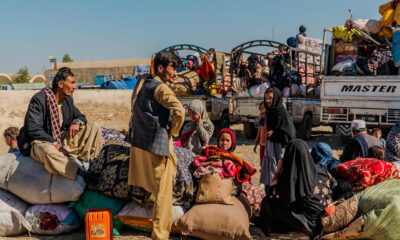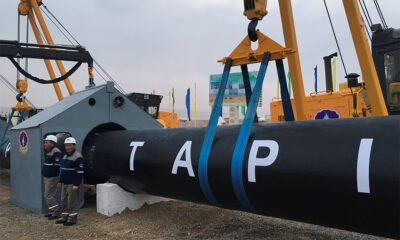Climate Change
Afghanistan cannot go another year without a voice on climate change: UNAMA

As the 28th United Nations conference on climate change (COP28) opened in Dubai, UNAMA on Friday stressed that Afghanistan cannot go another year without a voice on climate change.
“It is time to think creatively to ensure that in one year’s time, we are not approaching COP29 with yet another statement on Afghanistan’s absence,” UNAMA said in a statement.
It called on all stakeholders to move from awareness to action as climatic shocks and pressures continue to deeply affect the daily lives of millions of Afghans.
Afghanistan remains among the top ten most vulnerable and least ready countries to deal with the impacts of climate change. Nearly 20 million Afghans face emergency or crisis levels of food insecurity, driven by a third consecutive year of drought, economic pressures, and high vulnerability to other natural hazards – including two devastating earthquakes in the last two years. Climate change is further exacerbating negative impacts on health, sanitation, poverty, migration, and displacement, particularly for the most vulnerable, UNAMA said.
While the United Nations and partners are assisting Afghans respond and build resilience to changing climatic conditions, current efforts are insufficient. Humanitarian funding continues to decline, and climate finance remains largely suspended. Afghan voices are still absent from global climate fora, and the de facto authorities have yet to create a conducive policy and operational environment under a codified system of governance to support access to global funds, according to UNAMA.
“This situation is unsustainable,” said the Special Representative of the Secretary-General for Afghanistan and head of UNAMA, Roza Otunbayeva. “UNAMA has repeatedly noted that mitigating and adapting to climate change and building climate resilience in the country cannot wait. All stakeholders must engage on this issue in an apolitical and constructive manner for the benefit of the Afghan people.”
UNAMA said that while awareness of the grave challenges of climate change in Afghanistan is growing, awareness alone will not build the resilience so desperately needed among communities.
“Now is the time to move from awareness to action,” said Otunbayeva. “This will require bold, collective and tangible action, at scale, backed by engagement, financing and governance efforts, including on shared regional climate threats. It is a shared burden which will require resources as well as harnessing the potential of all Afghans.”
Climate Change
Rescuers race to reach those trapped by floods in China’s Guangdong

WATCH: Rescuers on boats in China’s flood-ravaged Guangdong province raced to evacuate trapped residents, carrying some elderly people by piggyback from their homes and deploying helicopters to save villagers caught in rural landslides.
The southern Chinese province has been battered by unusually heavy, sustained and widespread rainfall since Thursday, with powerful storms ushering in an earlier-than-normal start to the region’s annual flooding season, Reuters reported.
Eleven people were missing in Guangdong by Monday morning, the state-owned Xinhua News Agency reported without giving further details.
Across the province, 53,741 people have been relocated, with 12,256 people being urgently resettled, Xinhua reported, citing the provincial government.
The cities of Shaoguan, Qingyuan, Zhaoqing and Jiangmen to the west and north of the provincial capital Guangzhou have been particularly hard hit.
In Qingyuan, houses and shops along the Bei River were submerged as the Pearl River tributary swelled, local media reported.
Aerial footage showed flood waters overwhelming a nearby town, leaving only roofs and treetops untouched.
Rescuers in Qingyuan tackled muddy waters, neck-high in some areas, to extract residents, including an elderly lady trapped in waist-deep water in an apartment building, videos on social media showed.
Other social media videos showed water gushing through roads and vehicles in disarray.
In Shaoguan, landslides trapped villagers who had to be rescued by helicopter while other rescuers traveled on foot to reach cut-off disaster sites, Reuters reported.
The Chinese military also stepped in to help clear roads.
The rains eased early on Monday, but some schools in the province were suspended.
Powerful thunderstorms are expected to return later in the week after a brief respite, marking an unusually early wet spell that is more typical in the months of May and June.
Climate Change
Massive river flooding expected in China, threatening millions

Major rivers, waterways and reservoirs in China’s Guangdong province are threatening to unleash dangerous floods, forcing the government on Sunday to enact emergency response plans to protect more than 127 million people.
Calling the situation “grim”, local weather officials said sections of rivers and tributaries at the Xijiang and Beijiang river basins are hitting water levels in a rare spike that only has a one-in-50 chance of happening in any given year, state broadcaster CCTV news said on Sunday.
China’s water resource ministry issued an emergency advisory, CCTV reported.
Guangdong officials urged departments in all localities and municipalities to begin emergency planning to avert natural disasters and promptly disperse disaster relief funds and materials to ensure affected people have food, clothing, water and a place to live, Reuters reported.
The province, a major exporter and one of China’s main commercial and trading centers, has seen torrid downpours for several days and strong winds due to severe convective weather, which has also affected other parts of China.
A 12-hour stretch of heavy rain, starting from 8 p.m. (1200 GMT) Saturday, battered the central and northern parts of the province in the cities of Zhaoqing, Shaoguan, Qingyuan and Jiangmen.
Almost 20,000 people have been evacuated in Qingyuan, according to state media, and some power facilities in Zhaoqing were damaged, cutting power to some places, Reuters reported.
Climate Change
UN sounds ‘Red Alert’ as world smashes heat records in 2023

Every major global climate record was broken last year and 2024 could be worse, the World Meteorological Organization (WMO) said on Tuesday, with its chief voicing particular concern about ocean heat and shrinking sea ice, Reuters reported.
The U.N. weather agency said in its annual State of the Global Climate report that average temperatures hit the highest level in 174 years of record-keeping by a clear margin, reaching 1.45 degrees Celsius above pre-industrial levels.
Ocean temperatures also reached the warmest in 65 years of data with over 90% of the seas having experienced heatwave conditions during the year, the WMO said, harming food systems.
“The WMO community is sounding the Red Alert to the world,” said WMO Secretary-General Celeste Saulo, who took over the job in January.
“What we witnessed in 2023, especially with the unprecedented ocean warmth, glacier retreat and Antarctic sea ice loss, is cause for particular concern.”
She later told reporters that ocean heat was particularly concerning because it was “almost irreversible”, possibly taking millennia to reverse.
“The trend is really very worrying and that is because of the characteristics of water that keep heat content for longer than the atmosphere,” she said.
Climate change, driven by the burning of fossil fuels, coupled with the emergence of the natural El Nino climate pattern, pushed the world into record territory in 2023, read the report.
WMO’s head of climate monitoring, Omar Baddour, told reporters there was a “high probability” that 2024 would set new heat records, saying that the year after an El Nino was typically warmer still.
Tuesday’s report showed a big plunge in Antarctic sea ice, with the peak level measured at 1 million km2 below the previous record – an area roughly equivalent to the size of Egypt.
That trend, combined with ocean warming which causes water to expand, has contributed to a more than doubling of the rate of sea-level rise over the past decade compared with the 1993-2002 period, it said.
Ocean heat was concentrated in the North Atlantic with temperatures an average 3 degrees Celsius above average in late 2023, the report said. Warmer ocean temperatures affect delicate marine ecosystems and many fish species have fled north from this area seeking cooler temperatures, Reuters reported.
Saulo, a meteorologist from Argentina who has promised to strengthen global warning systems for climate disasters, said she hoped the report would raise awareness of the “vital need to scale up the urgency and ambition of climate action”.
“That’s why we spoke about the Red Alert because we must care for the people and how they will suffer from these more frequent, more extreme events,” she told reporters. “If we do nothing, things will become worse and that will be our responsibility.”
-

 Latest News5 days ago
Latest News5 days agoRashid Khan named AWCC’s brand ambassador
-

 Sport5 days ago
Sport5 days agoJaiswal ton powers Rajasthan to big IPL win
-

 World4 days ago
World4 days agoNorth Korea officials visit Iran in a rare public trip
-

 Sport4 days ago
Sport4 days ago‘Serious talent’ Fraser-McGurk bonds with Warner to light up IPL
-

 Latest News4 days ago
Latest News4 days agoOver 1,000 Afghan refugees forced out of Pakistan in one day
-

 Regional2 days ago
Regional2 days agoNew UK sanctions target Iranian drone industry
-

 Sport2 days ago
Sport2 days agoAfghanistan beat Iraq 5-3, inch closer to Futsal World Cup berth
-

 Regional3 days ago
Regional3 days agoTurkey accuses U.S. of double standards over Gaza in rights report
























